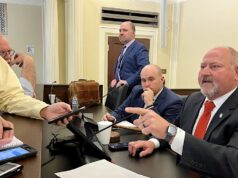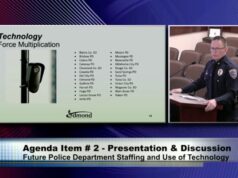
Mike Christian has included the same three things in his door knocking pack since he first ran for office in 2006 — a map of his turf, a stack of pamphlets and a bottle of water.
This year, he added hand sanitizer and a mask to that list.
Among the many impossible-to-predict consequences that the COVID-19 pandemic has had on local candidates, its effect on door knocking and other in-person campaigning efforts could be the most significant.
Whether to knock on constituents’ doors has become one of the most contentious campaign strategy questions of 2020. With the door knocking season already significantly shortened by restrictions in the pandemic’s early months, general election candidates have had to decide how to best get voters to the ballot box.
For Christian, who is trying to win back the Oklahoma House of Representatives seat he gave up in 2016, this means doubling his efforts to make up for lost time.
“It would be nice if we could have 30,000 people come out and vote, but they don’t,” he said. “So, you know, you just go out and try to meet as many people as you can.”
Christian said his mask, which reads “In God We Trust,” puts some concerned constituents at ease. But there are still fewer people answering doors than he’s used to.
The situation has caught the attention of those who study politics for a living.
“How often you want to open your door to a stranger in general?” asked Tyler Johnson, a political science professor at the University of Oklahoma. “And then in a pandemic, you’re probably less likely to want to open the door.”
Data on door knocking can be difficult to collect since tracking methods vary by campaign. However, many political scientists agree it can be one of the most effective ways local candidates can drive voter turnout.
That being said, Johnson emphasized that determining how voters will respond to in-person campaigning in 2020 involves a lot of guesswork.
“If the candidate makes a good argument as to why they’re not going door-to-door, I think there’s the potential for that argument to be respected,” he explained.
One candidate trying to make such an argument is Christian’s opponent, Rep. Mickey Dollens (D-OKC) who has been in office since 2016.
The Dollens campaign has not been actually knocking on doors this year. Instead, the candidate said he’s been leaving informational flyers with the his personal contact information at voters’ houses.
“They don’t want to get sick. Obviously, they don’t want to get anyone else sick,” he said. “If they want to get in contact with me, they have my phone number.”
Even before the pandemic, Johnson said many candidates limited their time at constituents’ doors. Extensive door knocking can be too costly for many campaigns.
Often, candidates instead choose to invest in advertising and handouts, like those Dollens is using.
For Rep. Jacob Rosecrants (D-Norman), nixing door-to-door efforts this year spurred him to try out a new campaigning technique — texting.
“We invested in a texting system where now we virtually knock doors,” Rosecrants said. “The responses are great, and it gives me a chance because everybody texts these days.
“I do still get to have those conversations because we did invest in this.”
Rosecrants said he is so impressed with the responses he has gotten through texting that he hopes to continue using the technology alongside his door knocking efforts in elections to come.




















